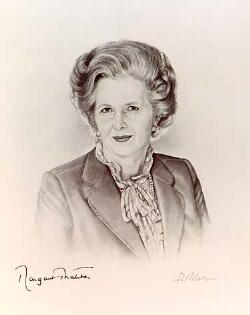Page 1
World War III
Chapter 1.0 - The Crisis of Poland
By Adam Yoshida
Reminiscing on the Cold War at her home in 1989, shortly before she returned to power for the second time Lady Margaret Thatcher was head to remark that, "The Iron Curtain was like a poorly manufactured dam. It was bound to burst some day, and when it did it flooded Europe," Her assessment was as usual, right on the mark.
Fig. 1. Lady Margaret ThatcherIn 1979 the fortunes of the West were at their lowest ebb. The oil crisis had caused hyper-inflation and recession, the United States was suffering from shattered self confidence, and everywhere petty tyrants paraded the incompetence of the west for the world to see. There were a few new weapons, but the planned rearmament was still some years from fruition. The American people widely considered President Carter to be a 'lame duck' and thus didn't expect him to take decisive action against the Soviets anywhere, especially since he had denounced their 'inordinate fear of communism.' American arms were at a nadir in the Cold War period, the all -volunteer American Army lacked men, and despite some nice pay increases morale was low. Force levels and equipment procurement had been cut back substantially, the USAF was stretched to the limit flying worn-out aircraft, the Army was torn by drug problems and racial strife, the Navy was trying to meet a three ocean commitment with a one and a half ocean fleet.
The unexpected Polish revolt of September 1979 broke the dam. To this date no one has clearly established what exactly happened in Gdansk, most accounts do agree that it was one of the minor and inconsequential events that history sometimes turn around on. Whatever it was it was important enough for the workers of the Gdansk shipyard to go on strike demanding a number of reforms. After a few hours the Polish authorities ordered the police to arrest the troublemakers, however, the workers drove off the police by barricading themselves inside the shipyard. Rumors began to spread around Gdansk, and soon the entire nation, that the Government was not going to use force against the workers. By the second day of the strike nearly every major Polish shipyard was on strike and in some cities workers in other industries were considering walking off the job as well.
As the strikes dragged on into the end of September the Polish Government began to contemplate asking the Soviet Government to use military force to break the strikes. The Soviets vetoed this, they were reluctant to upset the west, especially as they were planning to invade Afghanistan soon. Thus the Polish authorities were left helpless as the strikes multiplied in number right up until the end of October when the Polish requested help from the Soviet military against the 'reactionary counter-revolutionaries.' The Soviets declined to do so, pointing out to the Polish Government, "You do have your own military, you know."


